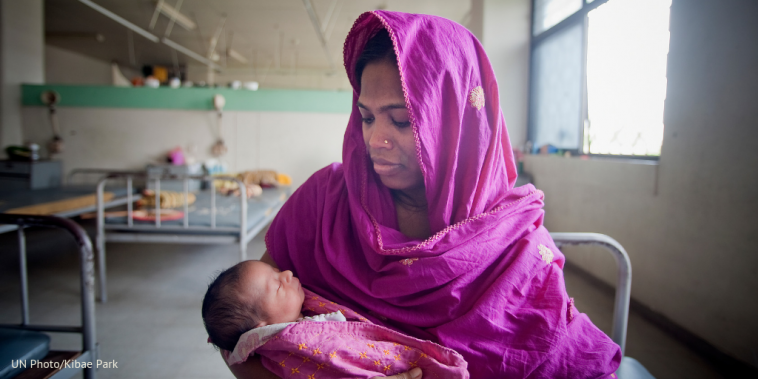FIGO members play a crucial role
FIGO believes that pregnancy offers a unique opportunity to integrate maternal and child health services with health promotion and NCDs prevention.

Achieving quality Universal Health Coverage (UHC) requires strengthening health systems in all countries.
As health professionals, FIGO’s members can play a crucial role in improving health outcomes, including educating patients on how to take care of their health, coordinating care and advocating for their patients’ needs to facility managers and policy-makers.
WHO have an ambition to mobilise health professionals to deal effectively with the current and future challenges to health and to take joint actions to build stronger and sustainable health care towards achieving UHC. They have outlined 16 essential health services in 4 categories as indicators of the level and equity of coverage in countries, one of which is prevention and treatment of raised blood glucose as a non-communicable disease (NCDs).
FIGO believes that pregnancy offers a unique opportunity to integrate maternal and child health services with health promotion and NCDs prevention, thereby providing a bridge to create more integrated services to address SDG 3. We raised the issue of links between maternal health and NCDs at last year’s High Level meeting of the UN General Assembly, asking that any efforts to address NCDs should begin with, and substantially focus on, preconception and maternal health.
Shortly afterwards, during the FIGO World Congress, FIGO’s Pregnancy and NCDs Committee launched our global Hyperglycemia in Pregnancy (HIP) Declaration. We resolved to address this challenge of intergenerational transmission of health risk and to convert it into an opportunity for improved health outcome for mothers and their newly born babies and stem the rising curve of NCDs, to improve future population health.
Our Declaration announced a commitment to:
- Undertake actions in our various individual and collective capacities to support efforts to address the link between maternal health obesity and diabetes as a public health priority
- Undertake actions in our various individual and collective capacities to support efforts to address the needs of women with regard to hyperglycemia in pregnancy (including pre-pregnancy and postpartum)
- Accelerate the implementation of the FIGO GDM initiative globally; through policy actions, resource mobilisation and ensuring that all pregnant women attending health facilities are tested for hyperglycemia using a single-step procedure, as advocated by FIGO.
- Support efforts to increase public awareness about hyperglycemia in pregnancy and its impact on maternal and child health, encourage preconception counselling, antenatal care and post-partum follow up.
- Encourage task shifting and support role-based training to build capacity for prevention, early diagnosis, and treatment of HIP and continued engagement with the high risk mother child pair over a prolonged time period linked to the child's vaccination program by engaging and collaborating with other health care professionals.
- Advocate for access to uninterrupted diagnostic supplies, medications and trained staff for diagnosis and appropriate management for HIP at all levels of care keeping the pregnant women's convenience in mind and at affordable costs.
- Promote and celebrate National GDM Awareness Day in our countries as an instrument to bring public attention and raise awareness of the problem.
- Help develop and carry out a robust research agenda that fuels both the discovery of new tools and procedures to improve point of care diagnostics, monitoring and management of HIP and the ability to engage, counsel and track the mother-child pair over the long term; as well as carry out operational research to improve collaboration and efficacy in existing programs, keeping in mind the health care delivery realities in different parts of the world.
Improving antenatal coverage, ensuring early booking and better basic screening and treatment services for common medical conditions, as well as, postpartum follow up as an integral part of UHC implementation plan, provides the best return on investment in health because of its additional cascading beneficial impact on future population health.
The outstanding efforts of our Pregnancy and NCDs Committee highlights just how significant FIGO’s 132 member societies are, as a unified and mobilised community. By taking joint action to strengthen health systems and advocating for patient needs, we can facilitate quality UHC implementation to improve health outcomes for mothers and newborns, and thereby address both current and future challenges of health.